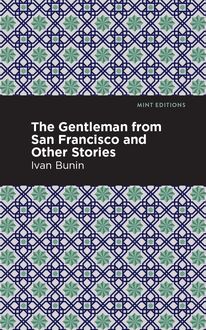-
 Univers
Univers
-
 Ebooks
Ebooks
-
 Livres audio
Livres audio
-
 Presse
Presse
-
 Podcasts
Podcasts
-
 BD
BD
-
 Documents
Documents
-
- Cours
- Révisions
- Ressources pédagogiques
- Sciences de l’éducation
- Manuels scolaires
- Langues
- Travaux de classe
- Annales de BEP
- Etudes supérieures
- Maternelle et primaire
- Fiches de lecture
- Orientation scolaire
- Méthodologie
- Corrigés de devoir
- Annales d’examens et concours
- Annales du bac
- Annales du brevet
- Rapports de stage
La lecture à portée de main
Vous pourrez modifier la taille du texte de cet ouvrage
Découvre YouScribe en t'inscrivant gratuitement
Je m'inscrisDécouvre YouScribe en t'inscrivant gratuitement
Je m'inscrisEn savoir plus
Vous pourrez modifier la taille du texte de cet ouvrage
En savoir plus

Description
The Gentleman from San Francisco and Other Stories (1922) is a collection of short stories by Russian author and Nobel laureate Ivan Bunin. Published in Russian in 1915, The Gentleman from San Francisco and Other Stories was first translated to English in 1922 by D.H. Lawrence, Leonard Woolf, and Samuil Koteliansky, and was published by Virginia and Leonard Woolf’s storied Hogarth Press. The title story, translated by Lawrence and Koteliansky, is among Bunin’s most famous works and was considered upon publication to be the finest work of Russian literature since the deaths of Anton Chekhov and Leo Tolstoy.
“The Gentleman from San Francisco” is the story of an American millionaire who travels to Italy while on a lengthy vacation with his wife and daughter. Disappointed with the weather in Naples, as well as with the rundown state of the city, the family journeys to the island of Capri where, in the lobby of their luxury hotel, the man dies. The remainder of the story captures the reaction of the hotel’s wealthy clientele, as well as the indifference and hostility with which the staff treat the gentleman’s body. Noted for its cold, critical tone, as well as its subtle critique of wealth and American exceptionalism, “The Gentleman from San Francisco” is a masterpiece of Russian literature and an essential work of short fiction. Included in this collection are the stories “Gentle Breathing,” “Kasimir Stanislavovitch,” and “Son,” all of which capture the breadth and intricacy of Bunin’s literary style. The Gentleman from San Francisco and Other Stories is a compact and compelling collection of stories from one of Russia’s greatest writers, translated by two of the most important figures in early twentieth century English literature.
With a beautifully designed cover and professionally typeset manuscript, this edition of Ivan Bunin’s The Gentleman from San Francisco and Other Stories is a classic of Russian literature reimagined for modern readers.
Sujets
Informations
| Publié par | Mint Editions |
| Date de parution | 01 décembre 2020 |
| Nombre de lectures | 0 |
| EAN13 | 9781513273723 |
| Langue | English |
| Poids de l'ouvrage | 1 Mo |
Informations légales : prix de location à la page 0,0250€. Cette information est donnée uniquement à titre indicatif conformément à la législation en vigueur.
Extrait
The Gentleman from San Francisco and Other Stories
Ivan Bunin
The Gentleman from San Francisco and Other Stories was first published in 1915.
This edition published by Mint Editions 2021.
ISBN 9781513268729 | E-ISBN 9781513273723
Published by Mint Editions®
minteditionbooks.com
Publishing Director: Jennifer Newens
Design & Production: Rachel Lopez Metzger
Translated by: Samuel Solomonovich Koteliansky, Leonard Woolf and David Herbert Lawrence
Typesetting: Westchester Publishing Services
C ONTENTS T HE G ENTLEMAN FROM S AN F RANCISCO G ENTLE B REATHING K ASIMIR S TANISLAVOVITCH S ON
T HE G ENTLEMAN FROM S AN F RANCISCO
“Woe to thee, Babylon, that mighty city!”
A POCALYPSE
T he gentleman from San Francisco—nobody either in Capri or Naples ever remembered his name—was setting out with his wife and daughter for the Old World, to spend there two years of pleasure.
He was fully convinced of his right to rest, to enjoy long and comfortable travels, and so forth. Because, in the first place he was rich, and in the second place, notwithstanding his fifty-eight years, he was just starting to live. Up to the present he had not lived, but only existed; quite well, it is true, yet with all his hopes on the future. He had worked incessantly—and the Chinamen whom he employed by the thousand in his factories knew what that meant. Now at last he realized that a great deal had been accomplished, and that he had almost reached the level of those whom he had taken as his ideals, so he made up his mind to pause for a breathing space. Men of his class usually began their enjoyments with a trip to Europe, India, Egypt. He decided to do the same. He wished naturally to reward himself in the first place for all his years of toil, but he was quite glad that his wife and daughter should also share in his pleasures. True, his wife was not distinguished by any marked susceptibilities, but then elderly American women are all passionate travellers. As for his daughter, a girl no longer young and somewhat delicate, travel was really necessary for her: apart from the question of health, do not happy meetings often take place in the course of travel? One may find one’s self sitting next to a multimillionaire at table, or examining frescoes side by side with him.
The itinerary planned by the Gentleman of San Francisco was extensive. In December and January he hoped to enjoy the sun of southern Italy, the monuments of antiquity, the tarantella, the serenades of vagrant minstrels, and, finally, that which men of his age are most susceptible to, the love of quite young Neapolitan girls, even when the love is not altogether disinterestedly given. Carnival he thought of spending in Nice, in Monte Carlo, where at that season gathers the most select society, the precise society on which depend all the blessings of civilization—the fashion in evening dress, the stability of thrones, the declaration of wars, the prosperity of hotels; where some devote themselves passionately to automobile and boat races, others to roulette, others to what is called flirtation, and others to the shooting of pigeons which beautifully soar from their traps over emerald lawns, against a background of forget-me-not sea, instantly to fall, hitting the ground in little white heaps. The beginning of March he wished to devote to Florence, Passion Week in Rome, to hear the music of the Miserere; his plans also included Venice, Paris, bull-fights in Seville, bathing in the British Isles; then Athens, Constantinople, Egypt, even Japan… certainly on his way home… And everything at the outset went splendidly.
It was the end of November. Practically all the way to Gibraltar the voyage passed in icy darkness, varied by storms of wet snow. Yet the ship travelled well, even without much rolling. The passengers on board were many, and all people of some importance. The boat, the famous Atlantis , resembled a most expensive European hotel with all modern equipments: a night refreshment bar, Turkish baths, a newspaper printed on board; so that the days aboard the liner passed in the most select manner. The passengers rose early, to the sound of bugles sounding shrilly through the corridors in that grey twilit hour, when day was breaking slowly and sullenly over the grey-green, watery desert, which rolled heavily in the fog. Clad in their flannel pyjamas, the gentlemen took coffee, chocolate, or cocoa, then seated themselves in marble baths, did exercises, thereby whetting their appetite and their sense of well-being, made their toilet for the day, and proceeded to breakfast. Till eleven o’clock they were supposed to stroll cheerfully on deck, breathing the cold freshness of the ocean; or they played table-tennis or other games, that they might have an appetite for their eleven o’clock refreshment of sandwiches and bouillon; after which they read their newspaper with pleasure, and calmly awaited luncheon—which was a still more varied and nourishing meal than breakfast. The two hours which followed luncheon were devoted to rest. All the decks were crowded with lounge chairs on which lay passengers wrapped in plaids, looking at the mist-heavy sky or the foamy hillocks which flashed behind the bows, and dozing sweetly. Till five o’clock, when, refreshed and lively, they were treated to strong, fragrant tea and sweet cakes. At seven bugle-calls announced a dinner of nine courses. And now the Gentleman from San Francisco, rubbing his hands in a rising flush of vital forces, hastened to his state cabin to dress.
In the evening, the tiers of the Atlantis yawned in the darkness as with innumerable fiery eyes, and a multitude of servants in the kitchens, sculleries, wine-cellars, worked with a special frenzy. The ocean heaving beyond was terrible, but no one thought of it, firmly believing in the captain’s power over it. The captain was a ginger-haired man of monstrous size and weight, apparently always torpid, who looked in his uniform with broad gold stripes very like a huge idol, and who rarely emerged from his mysterious chambers to show himself to the passengers. Every minute the siren howled from the bows with hellish moroseness, and screamed with fury, but few diners heard it—it was drowned by the sounds of an excellent string band, exquisitely and untiringly playing in the huge two-tiered hall that was decorated with marble and covered with velvet carpets, flooded with feasts of light from crystal chandeliers and gilded girandoles, and crowded with ladies in bare shoulders and jewels, with men in dinner-jackets, elegant waiters and respectful maîtres d’hôtel , one of whom, he who took the wine-orders only, wore a chain round his neck like a lord mayor. Dinner-jacket and perfect linen made the Gentleman from San Francisco look much younger. Dry, of small stature, badly built but strongly made, polished to a glow and in due measure animated, he sat in the golden-pearly radiance of this palace, with a bottle of amber Johannisberg at his hand, and glasses, large and small, of delicate crystal, and a curly bunch of fresh hyacinths. There was something Mongolian in his yellowish face with its trimmed silvery moustache, large teeth blazing with gold, and strong bald head blazing like old ivory. Richly dressed, but in keeping with her age, sat his wife, a big, broad, quiet woman. Intricately, but lightly and transparently dressed, with an innocent immodesty, sat his daughter, tall, slim, her magnificent hair splendidly done, her breath fragrant with violet cachous, and the tenderest little rosy moles showing near her lip and between her bare, slightly powdered shoulder blades. The dinner lasted two whole hours, to be followed by dancing in the ball-room, whence the men, including, of course, the Gentleman from San Francisco, proceeded to the bar; there, with their feet cocked up on the tables, they settled the destinies of nations in the course of their political and stock-exchange conversations, smoking meanwhile Havana cigars and drinking liqueurs till they were crimson in the face, waited on all the while by negroes in red jackets with eyes like peeled, hard-boiled eggs. Outside, the ocean heaved in black mountains; the snow-storm hissed furiously in the clogged cordage; the steamer trembled in every fibre as she surmounted these watery hills and struggled with the storm, ploughing through the moving masses which every now and then reared in front of her, foam-crested. The siren, choked by the fog, groaned in mortal anguish. The watchmen in the look-out towers froze with cold, and went mad with their super-human straining of attention. As the gloomy and sultry depths of the inferno, as the ninth circle, was the submerged womb of the steamer, where gigantic furnaces roared and dully giggled, devouring with their red-hot maws mountains of coal cast hoarsely in by men naked to the waist, bathed in their own corrosive dirty sweat, and lurid with the purple-red reflection of flame. But in the refreshment bar men jauntily put their feet up on the tables, showing their patent-leather pumps, and sipped cognac or other liqueurs, and swam in waves of fragrant smoke as they chatted in well-bred manner. In the dancing hall light and warmth and joy were poured over everything; couples turned in the waltz or writhed in the tango, while the music insistently, shamelessly, delightfully, with sadness entreated for one, only one thing, one and the same thing all the time. Amongst this resplendent crowd was an ambassador, a little dry modest old man; a great millionaire, clean-shaven, tall, of an indefinite age, looking like a prelate in his old-fashioned dress-coat; also a famous Spanish author, and an international beauty already the least bit faded, of unenviable reputation; finally an exquisite loving couple, whom everybody watched curiously because of their unconcealed happiness: he danced only with her , and sang, with great skill, only to her accompaniment, and every
-
 Univers
Univers
-
 Ebooks
Ebooks
-
 Livres audio
Livres audio
-
 Presse
Presse
-
 Podcasts
Podcasts
-
 BD
BD
-
 Documents
Documents
-
Jeunesse
-
Littérature
-
Ressources professionnelles
-
Santé et bien-être
-
Savoirs
-
Education
-
Loisirs et hobbies
-
Art, musique et cinéma
-
Actualité et débat de société
-
Jeunesse
-
Littérature
-
Ressources professionnelles
-
Santé et bien-être
-
Savoirs
-
Education
-
Loisirs et hobbies
-
Art, musique et cinéma
-
Actualité et débat de société
-
Actualités
-
Lifestyle
-
Presse jeunesse
-
Presse professionnelle
-
Pratique
-
Presse sportive
-
Presse internationale
-
Culture & Médias
-
Action et Aventures
-
Science-fiction et Fantasy
-
Société
-
Jeunesse
-
Littérature
-
Ressources professionnelles
-
Santé et bien-être
-
Savoirs
-
Education
-
Loisirs et hobbies
-
Art, musique et cinéma
-
Actualité et débat de société
- Cours
- Révisions
- Ressources pédagogiques
- Sciences de l’éducation
- Manuels scolaires
- Langues
- Travaux de classe
- Annales de BEP
- Etudes supérieures
- Maternelle et primaire
- Fiches de lecture
- Orientation scolaire
- Méthodologie
- Corrigés de devoir
- Annales d’examens et concours
- Annales du bac
- Annales du brevet
- Rapports de stage




















